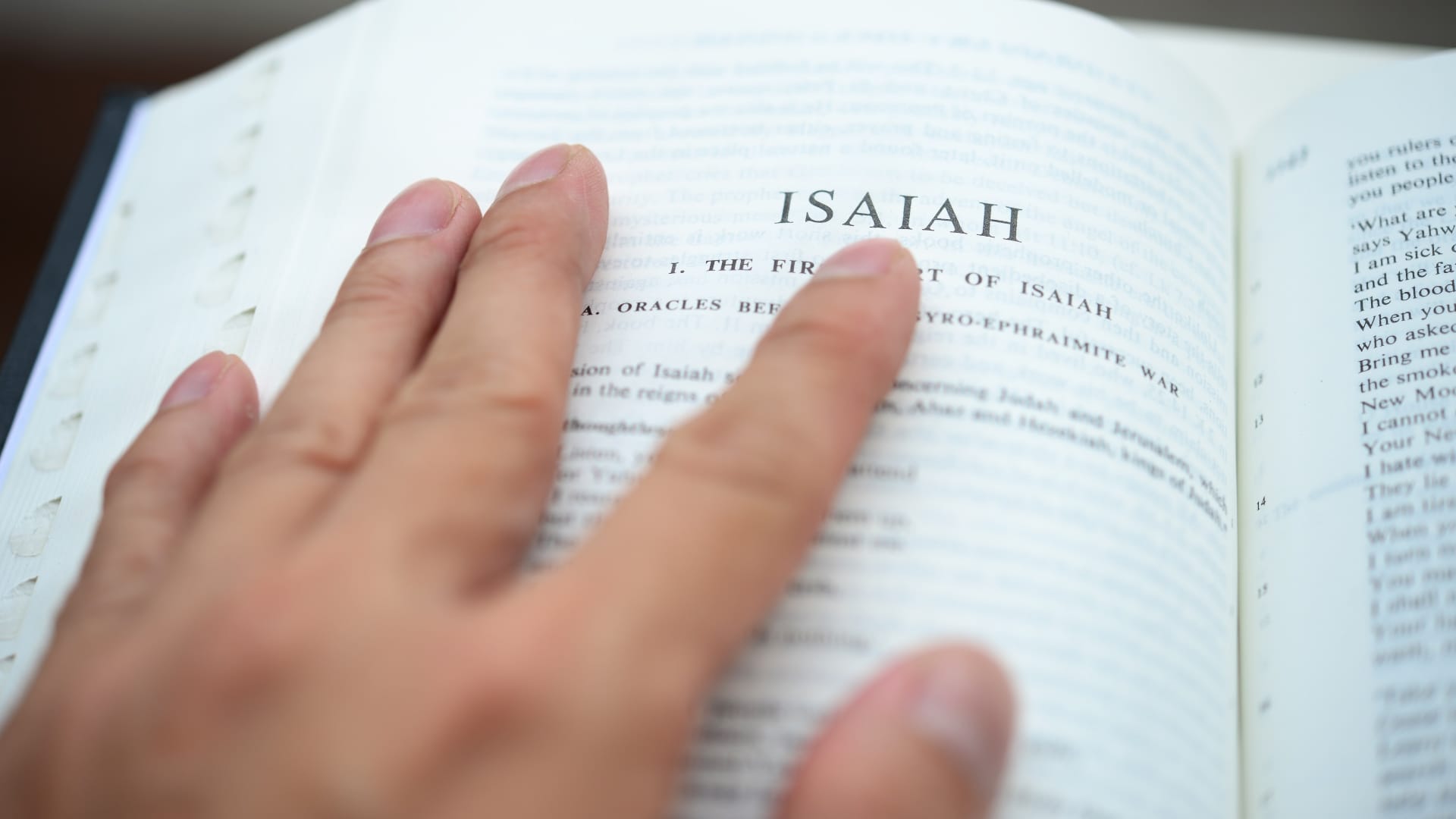Hope for Tired Christians (Isaiah 40:27-31)

Big Idea: Tired Christians find hope in waiting for God's gospel promises.
I have a question I want to ask you today: are you tired?
I have a theory: we’re all running a little tired right now. When you buy a new phone or tablet, it’s amazing. The device is fast. The battery seems to last forever. But if you have ever held on to a smartphone or tablet for a long time, you know what begins to happen. The device doesn’t run as fast as it used to. It slows down. And the battery doesn’t last. You can charge that thing all night, and when you go to use it the next day, the battery drops to 80% right away, and then goes down from there.
I think that’s a pretty good picture of how a lot of us feel right now. The past 15 months have been difficult for us. They call this pandemic fatigue:
At this point in the pandemic, people are tired of being cooped up due to restrictions on indoor gatherings outside the home. They are also tired of wearing masks, physical distancing, being away from family and friends, and increasingly fed up with the “new normal” routines. People are experiencing a type of burnout that experts are calling COVID-19 fatigue…
A Globe and Mail story reports:
The pandemic has affected each of us differently, but there has been a staggering increase in anxiety, depression, substance use and other mental health disorders since it began. A recent study conducted by Mental Health Research Canada found that 25 per cent of Canadians are struggling with anxiety and 17 per cent are dealing with depression as a result of the pandemic, the highest rates to date. A report by the Centre for Addiction and Mental Health (CAMH), found that one in five are experiencing high levels of mental distress.
So let me ask you again: are you tired? Today’s passage has a message for you.
Let me give you a little background.
Isaiah 40 addressed God's people during their exile. It was meant to be read by God’s people while they were far from home in Babylon. The intended audience were a people who had rebelled, had experienced the destruction of Jerusalem, and who felt demoralized, exhausted, hopeless, on the edge of despair. They would have felt like God had abandoned them, and that they had no future left.
And so Isaiah 40 begins with these words: “Comfort, comfort my people, says your God. Speak tenderly to Jerusalem, and cry to her.” God’s people needed comfort at this point. They were tired and discouraged and needed hope. And that’s what God gives them. We end up with one of the richest and most encouraging chapters in all of Scripture. You could camp out on Isaiah 40 for months and not get tired of it.
Why should God’s people hang in there when they’re tired? What’s going to keep them going when it would be easy to give up?
I wish I could spend weeks with you answering that question. I’d take you through verses 1 to 26 which tell us that we should not give up because there is nobody who compares in majesty to our God. When you get one glimpse at who God is and what he’s going to do — that he’s going to come to us in overwhelming glory and remake the world, and that he can do this because he is unbelievably great — you will be comforted. The greatest need we have in this broken and discouraging world is to lift our eyes and see God for who he is. God is our only hope, and the worse the world gets, the more we need this.
Why shouldn’t you give up when you’re on the edge of despair? Because of who God is and what he’s going to do. That’s the message of verses 1 to 26. Whenever you get discouraged and overwhelmed, lift your eyes to God. He is what you need.
That’s what verses 1 to 26 tell us. But today I want to look at verses 27 to 31. Here’s the question I want to ask: What’s going to help us endure and actually move forward as God’s people when we’re tired and discouraged? Verses 27 will help us with this by describing our hope in moving forward.
Isaiah describes helps us move through three phases.
Phase One: Our Despair (40:27)
The place to begin is with where we are right now. Verse 27 says:
Why do you say, O Jacob,
and speak, O Israel,
“My way is hidden from the LORD,
and my right is disregarded by my God”?
I want you to put yourself in the place of God’s people at this time. They would have felt abandoned by God. How could God allow them to be dragged so far from home? What had happened to God’s promises? What happens when you look around, and it looks like God has abandoned you?
It’s easy to look around sometimes at your circumstances and conclude that God has abandoned you. Some of you know what that feels like. You look around at what’s happening in your life and you feel like God has completely abandoned you, that he’s turned his back on you forever.
I think we all feel like that sometimes. I know that I’ve felt a little discouraged sometimes lately as I’ve not only felt weary from the pandemic, but have seen all the bad news in the world, along with the polarization between people even within the church.
To be sure, there is a kind of doubt that does not honor God. Some kinds of doubt express a kind of defiant rebellion against God. It’s okay to question God, but it’s never okay to accuse him.
I am amazed, though, at how Scripture allows us to come to God with our honest struggles, even about him. The psalms often give voice to the most honest questions and doubts. They model for us how we can come to God with our honest emotions not because we don’t trust him, but because we do. That’s what we see in this passage: God’s people wrestling with very honest feelings that God has somehow abandoned them, that they have been abandoned by God.
Verse 27 points out that they keep saying they’ve been abandoned and forgotten by God. This isn’t a one-time thought. This had become a continual pattern. On an ongoing basis, they felt that God had abandoned them.
Philip Yancey says, “Throw at him your grief, your anger, your doubt, your bitterness, your betrayal, your disappointment—he can absorb them all.”
Even in verse 27, in the middle of despair, God begins to reassure his people. He calls them Jacob and Israel. He’s reminding them that they’re not the first to wrestle with God. Jacob did centuries earlier, and God blessed him. Just as God was faithful to Isaac, the new name for Jacob, he will remain faithful to them. They are God’s covenant people, and he will not abandon them.
That’s where we begin: with despair. We’re all going to be there at least some of the time. If you’re feeling despair today, you’re not alone. That’s where Isaiah begins in this passage, and it may be where you are today.
That’s the first phase. But then Isaiah moves us to the second phase in verse 28:
Phase Two: God’s Greatness (40:28)
Read, re-read, memorize, and meditate on verse 28:
Have you not known? Have you not heard?
The LORD is the everlasting God,
the Creator of the ends of the earth.
He does not faint or grow weary;
his understanding is unsearchable.
There is nothing that a discouraged person needs more than this.
Isaiah said they needed to relearn what they already knew. They didn’t need new information. They needed to remember what we all tend to forget in the middle of our problems. That is one of the reasons why we need God’s Word preached to us every week: not because we need new information, but because we so quickly forget what we already know to be true.
What did they need to remember? They need to remember three things about God:
- God is eternal — All we see is right now, this present moment. God isn’t like that. “God is not confined to time,” says Ray Ortlund. “In his sweeping eternality God is equally present to all points of time at once. He is always out ahead of us. So we should never panic if things aren’t falling together according to our deadlines. God is working his purpose out in his own way, at his own pace, without our hurried, nervous desperation.”
- God is Creator — He made everything. He is not short on power. If he has made everything, we never need to worry that any of it is beyond is control.
- God is untiring — We need rest all the time. We spend a third of our lives asleep. We get exhausted, but God never does. “He never grows tired or weary but is forever fresh, always alert, always able” (Ortlund).
If you have problems — and we all do — take a good look at God. Remind yourself of who he is. Move from despair to God’s greatness.
But that’s not all. Isaiah moves us to a final phase:
Phase Three: Our Renewal (40:29-31)
Here’s a word for you today on your 37th anniversary:
He gives power to the faint,
and to him who has no might he increases strength.
Even youths shall faint and be weary,
and young men shall fall exhausted;
but they who wait for the LORD shall renew their strength;
they shall mount up with wings like eagles;
they shall run and not be weary;
they shall walk and not faint.
(Isaiah 40:29–31)
Discouraged and tired people of God: stop looking at your problems and start looking at God. Because this is what will happen: the tireless God’s strength will overflow into your life.
Look at verse 30. The message is blunt: the strongest among us doesn’t have what it takes. Humans even at the peak of their strength don’t have what it takes. “Human strength at its best, in its prime, will inevitably fail,” says Ortlund. “We’re no match for the demands of life. But we’re not doomed to our own potential. There is a power beyond ourselves, and we can experience it.”
How do we get this power? By waiting for the LORD. What does waiting mean? It means that we confidently trust God to keep his promises. It means placing our confidence in God even when we have reason to doubt. It means believing God’s promises are true even when we haven’t seen those promises fulfilled quite yet. It means trusting God to keep his covenant promises even when you’re in exile in Babylon.
When we do that, the passage says, we’ll rise up on wings like eagles: the greatest of birds with strength to spare. We won’t faint even when things get tough because we’ll be relying on God’s strength and not simply our own. We’ll run and not be weary, walk and not faint.
The hope of this church in moving forward is trusting in God’s promises and power. God has promised so much to us in his gospel. The least of us, the most sinful of us, can come with empty hands of faith to Jesus and receive everything from him: a new heart, a new future, adoption into his family, and more. 2 Peter 1:4 talks about “his precious and very great promises” that we’ve received through the gospel.
And when we place our hope in the gospel, we will be able to move forward as individuals and churches not with a strength that’s our own, but in God’s strength and God’s power.
The church’s hope is not a pastor, no matter how gifted, or eloquence, no matter how great. The church’s hope is God and his gospel. Tired, discouraged Christian: as we look to God and wait for his gospel promises, we can move forward with renewed strength. We can have “more expectancy, more confidence, more faith, more God-reliance” (Spurgeon).
The only hope for tired Christians is waiting on God’s gospel promises.
Tired Christian, what’s going to help us not just endure but advance? Not our own strength, but God and his gospel. Look to him today and rely on his promises, and see what God will do through your life and your church.
Father, we are a weary people. I pray that we will look up from our problems and see you instead. And as we wait on your gospel promises, empower your church with more expectancy, more confidence, more faith, more trust. And help us to rise up on eagle’s wings so that we can run and not be weary, walk and not be faint. We pray this in Jesus’ mighty name. Amen.





